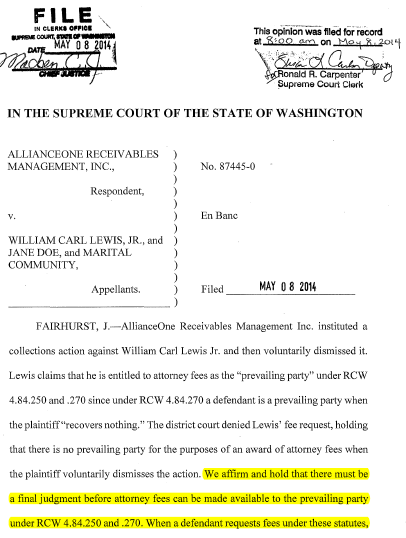 Small claims lawsuit dismissed with attorney's help, but can't get reimbursed expenses.
Small claims lawsuit dismissed with attorney's help, but can't get reimbursed expenses.
The "American Rule" for lawsuits is that both sides pay their own legal costs and attorney's fees unless a statute or contract allows otherwise. This is a balanced policy between making sure valid legal disputes get to court (without being too expensive to scare plaintiffs from seeking justice) and requiring reimbursement by the other side to encourage negotiation and ability to afford the legal expenses as a matter of good public policy goals. One area of possible reimbursement is in small claims cases (where the amount at issue is $10,000 or less) so that both sides consider the economic stakes and try to reach an agreement without a full court hearing - there are procedures to encourage both sides to make an offer of settlement or take on the risk of paying the other side's legal expenses. There are other laws and court rules to get reimbursement for frivolously filed court cases (without a legal basis or meant to harass the defendant), but this blog summary is focused on a recent court case about reimbursement by the "losing" side in a small claims case.
The Washington State Supreme Court decided that the small claims reimbursement statutes RCW 4.84.250 and .270 require a judge signed final order before the prevailing party in a small claims case has the right to have the opposing party reimburse legal expenses of the lawsuit. Thus a plaintiff can bring a lawsuit and get almost all the way through a court hearing and then voluntary dismiss its case (say they change their mind and undo their lawsuit when they realize they cannot win) and the defendant cannot take advantage of the reimbursement statutes even though they "win" in that the plaintiff gets nothing from them. The Washington State Supreme Court read the law such that there is only a prevailing party or "winner" if both sides go all the way through a lawsuit until a judge makes a decision and signs a court order. The following is a summary of a court case on this topic and you can find this case online at the Washington Courts website www.courts.wa.gov. Here is a copy of the court case opinion first page:

Mr. Lewis was sued by a collection agency who . . . oops withdrew its lawsuit after the defendant hired an attorney and proved he paid the bill already. Yet, no reimbursement of legal expenses because there was no full court hearing and order (judgment) signed by the judge. It appears that Mr. Lewis was sued for 3 alleged debts totaling $550.77 and then after the lawsuit was filed the collections agency did some research (that should have been done PRIOR to filing a lawsuit) and dismissed 2 of the alleged bills leaving a full lawsuit over $272.67 (but the collection agency attorney gets to add their legal expenses on top of this so it does not matter if the lawsuit is over $1 or $9,999). Mr. Lewis hired an attorney to prove he already paid the bill and then the collections agency asked to dismiss the whole lawsuit prior to them losing and being responsible to reimburse Mr. Lewis for his legal expenses.
Mr. Lewis argued that under the law he was a "prevailing party" and the plaintiff collection agency recovered "nothing" and thus they should be made to reimburse his legal expenses. The trial court disagreed so the case eventually ended up with the Washington State Supreme Court who decided that a plaintiff could file a lawsuit, run up legal expenses for the defendant, and then withdraw their lawsuit up until the last minute so as not to have to reimburse the defendant's legal expenses. Unfortunately, the defendant has no right to dismiss the lawsuit so is at the mercy of the plaintiff who may or may not care about a properly filed lawsuit with truth or prior research. The defendant would need to bring a separate motion claiming the lawsuit was frivolous and thus the plaintiff should be punished for bringing the lawsuit in the first place (this is VERY hard since judges do not like to punish attorneys or parties for coming to court). The Washington State Supreme Court determined this case based on the word "recovery" in the following statute (emphasis added to the word "recovery" that the court decided means there must be a full court hearing with a final court order):
RCW 4.84.270 Attorneys' fees as costs in damage actions of ten thousand dollars or less—When defendant deemed prevailing party.
The defendant, or party resisting relief, shall be deemed the prevailing party within the meaning of RCW 4.84.250, if the plaintiff, or party seeking relief in an action for damages where the amount pleaded, exclusive of costs, is equal to or less than the maximum allowed under RCW 4.84.250, recovers nothing, or if the recovery, exclusive of costs, is the same or less than the amount offered in settlement by the defendant, or the party resisting relief, as set forth in RCW 4.84.280.
The court decided that the words "recovers" and "recovery" mean a judicially enforceable document where something could be obtained (but if "nothing" is recoverable, then there is no legal document necessary to allow you to recover nothing). I respect the majority justices opinion and understand their policy goal of trying to get plaintiffs to be more likely to negotiate a settlement by giving them a "get out of jail free" card to be used up until the last minute, but I agree more with the dissenting opinion that the plaintiffs already have incentive to do proper investigation prior to bringing a lawsuit and at ANY TIME can dismiss their case to limit litigation expenses (for themselves and those that may be reimbursed). However, an innocent defendant CANNOT stop the lawsuit and their only bargaining tool is the threat of legal expenses reimbursement, which now is not a tool to encourage settlement. (There are other ways a defendant can try to dismiss the case such as motions for summary judgment and other legal tools that will costs thousands of dollars, but those are often also difficult to win and do not get you reimbursement of legal expenses.) It is hard for me to understand why the plaintiff "recovers nothing" when at the end of the lawsuit the plaintiff recovers (gets / secures / obtains / receives) nothing (no money / no property / no limitation / no restriction / not a thing).
Especially when plaintiffs are collections agencies who file batches of lawsuits every week with what seems like little or no real research to make sure all the claims are true OR when someone files lawsuits that may be without justification but based on emotions or for harassment (hard to get judges to legally find a case frivolous or abuse of the legal process) and drags an innocent person through court, or as the dissenting opinion clearly described it as:
"From the defendant's viewpoint, being wrongly sued where, as here, nothing is owed imposes on them the unnecessary burden to defend. This includes hiring an attorney, incurring costs and fees in defending the claim, and possible future consequences from the public court record of having been sued."
This case was decided by 5 justices in favor of requiring a full court case to the end with a judgement prior to their being a side who "recovers nothing" and 4 justices dissenting in favor of the interpretation that gives the ongoing pressure to the plaintiff to make sure their case is valid or suffer the consequences of having to reimburse the innocent defendant their legal expenses when they dismiss their case and . . . get nothing from the lawsuit.
![]() The blog posts on this website are intended for informational and advertising purposes and are NOT to be relied upon for any legal issues - they may be out of date or incomplete. You should consult an attorney for assistance and up-to-date legal research and analysis. Any comment you make, which is welcomed, and any replies I post to your comment are in a likewise manner and do not indicate an "attorney-client" relationship. Please read the DISCLAIMERS for use of this website.
The blog posts on this website are intended for informational and advertising purposes and are NOT to be relied upon for any legal issues - they may be out of date or incomplete. You should consult an attorney for assistance and up-to-date legal research and analysis. Any comment you make, which is welcomed, and any replies I post to your comment are in a likewise manner and do not indicate an "attorney-client" relationship. Please read the DISCLAIMERS for use of this website.







